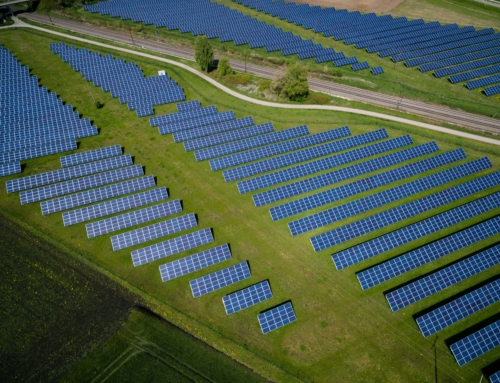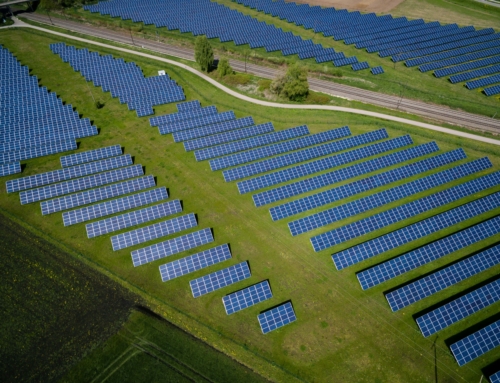
The Power of Solar Energy: A Clean and Renewable Solution for a Sustainable Future
Understanding Solar Energy
Solar energy is defined as the radiant light and heat emitted by the sun, an abundant and renewable energy source. The utilization of solar energy has gained significant attention in recent years as society seeks to shift from traditional fossil fuels to more sustainable power generation solutions. Unlike conventional energy sources, which often lead to depletion and environmental degradation, solar energy offers an inexhaustible supply, making it a pivotal component in the transition towards a sustainable future.
At the core of solar energy technology are photovoltaic (PV) cells and solar thermal energy systems. Photovoltaic cells convert sunlight directly into electricity through the photovoltaic effect, wherein certain materials generate an electric current when exposed to light. This technology has evolved considerably, culminating in highly efficient solar panels that can be integrated into a variety of environments, from residential rooftops to large-scale solar farms.
Solar thermal energy, on the other hand, harnesses sunlight to produce heat, which can then be utilized for heating applications, electricity generation, or even industrial processes. Solar thermal power systems typically include solar collectors that capture sunlight and transfer the heat to a fluid, which is then used to generate steam for driving turbines and producing electrical energy.
One of the significant advantages of solar energy is its minimal environmental impact compared to traditional energy sources. Solar power generation does not produce harmful emissions, significantly reducing the carbon footprint associated with energy production. Furthermore, solar energy systems require less water than conventional power plants, addressing concerns surrounding water scarcity in energy generation. By embracing this clean and renewable energy source, we can pave the way for a sustainable future characterized by reduced reliance on fossil fuels and diminished environmental impact.
Environmental Benefits of Solar Power
Solar power presents substantial environmental benefits that are crucial in the modern quest for sustainable energy solutions. One of the most significant advantages of solar energy is its capacity to mitigate greenhouse gas emissions. Unlike traditional fossil fuel sources, which release vast amounts of carbon dioxide (CO2) and other harmful gases into the atmosphere, solar power generates electricity without such emissions. By harnessing energy from the sun, we reduce our reliance on carbon-intensive fuels, contributing positively to the global effort to combat climate change.
In addition to reducing greenhouse gas emissions, solar energy plays a vital role in lowering air pollution levels. The combustion of fossil fuels is a primary source of pollutants such as sulfur dioxide, nitrogen oxides, and particulate matter, which can lead to serious health complications for the population. Transitioning to solar power not only decreases the discharge of these pollutants but also results in cleaner air for communities. The improvement of air quality brings profound benefits, especially for vulnerable groups such as children and the elderly, who are more susceptible to respiratory diseases associated with air pollution.
Furthermore, the environmental impact of solar technologies extends beyond air quality considerations. Traditional power generation methods often require substantial amounts of water for cooling processes and other operational needs. In contrast, solar energy systems, particularly photovoltaic panels, utilize minimal water. This water conservation becomes critically important in regions facing water scarcity, allowing for more efficient resource management. The adoption of solar energy, therefore, contributes to a more sustainable utilization of water resources while simultaneously addressing pressing environmental challenges.
Through the adoption of solar power, we can mitigate greenhouse gases, improve air quality, and conserve water, making significant strides toward achieving a cleaner and more sustainable future.
Conservation of Natural Resources and Wildlife
The transition to solar energy presents a significant opportunity for the conservation of natural resources, primarily by reducing our dependence on fossil fuels. Fossil fuels, which include coal, oil, and natural gas, are finite resources that not only deplete over time but also contribute adversely to climate change and environmental degradation through emissions and pollution. By harnessing solar energy, we can tap into an abundant and renewable resource that is capable of providing long-term energy sustainability while minimizing the ecological footprint.
Effective planning is crucial in solar projects to ensure that the deployment of solar installations does not disturb land and wildlife habitats. This involves assessing the ecological impact before initiating any projects, which can lead to the development of solar facilities in areas that are either already disturbed or have minimal ecological value. Many countries and organizations have implemented guidelines aimed at reducing the potential negative impacts on wildlife, thereby ensuring that solar energy developments coexist harmoniously with the natural environment.
For example, the Solar Partnership Program in California exemplifies effective planning in solar energy. This program aims to integrate solar farms with agricultural practices, allowing for dual land use that supports food production while generating renewable energy. Another case is the development of solar arrays on brownfields or degraded lands, which repurpose areas that would otherwise be unsuitable for agriculture or wildlife, thereby minimizing habitat disruption. These projects not only demonstrate the feasibility of solar energy but also highlight the importance of innovation in land use, allowing societies to advance toward sustainability without sacrificing biodiversity.
Ultimately, the shift to solar energy signifies not only a transition in energy sources but also an innovative approach to conserving natural resources and protecting wildlife. Through careful planning and implementation, we can harness the power of solar energy while preserving the delicate balance of our ecosystems.
Future of Solar Energy and Its Role in Environmental Sustainability
The future of solar energy stands as a pivotal component in transitioning towards a cleaner and more sustainable energy landscape. As technological innovations continue to enhance the efficiency and affordability of solar panels, this renewable energy source is poised to play an increasingly dominant role in our global energy infrastructure. Developments in photovoltaic material and energy storage solutions are making solar power more accessible and reliable than ever before.
Furthermore, the integration of solar energy into existing energy systems can be significantly augmented through appropriate policy frameworks. Governments around the world are beginning to recognize the urgent need for sustainable solutions and are implementing supportive legislation to promote solar energy adoption. These policy measures include tax incentives, renewable energy mandates, and investment in solar infrastructure. Such frameworks can not only enhance the economic viability of solar power but also stimulate job creation in the renewable energy sector, which is crucial for fostering a green economy.
Public awareness plays an equally vital role in the future of solar energy. As communities become more educated about the benefits of investing in solar technologies, there is a greater demand for sustainable solutions. Encouraging public engagement can lead to increased funding opportunities and support for local solar initiatives. Moreover, educational programs can help break down the misconceptions surrounding solar energy, fostering a culture that values and prioritizes sustainable practices.
In conclusion, the advancement of solar energy technology, combined with supportive policy frameworks and heightened public awareness, can significantly contribute to environmental sustainability goals. By harnessing the power of solar energy, society can protect the planet for future generations, leading to a greener, more sustainable world. The potential for solar energy is immense, and its continued development is critical for achieving a sustainable future.








